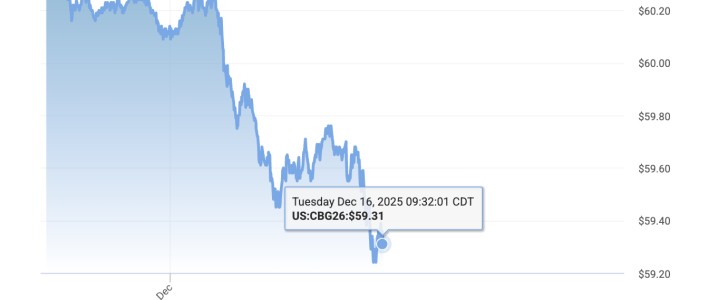“Through our ‘Superpower Mississippi’ initiative, we’re making a $300 million investment to transform our grid like never before,” said Haley Fisackerly, president and chief executive officer of Entergy Mississippi. “Typically, these kinds of large-scale upgrades would translate to higher electricity bills for our customers. But thanks to the influx of new customers like Amazon coming to Mississippi, we’re able to fund these critical reliability improvements without passing any added costs on to our residential and small business customers. It’s a true win-win: We’re delivering a more robust, resilient grid, while ensuring our rates remain well below the national average.”
Category: 3. Business
-
Secretary Chavez-DeRemer statement on November jobs report – U.S. Department of Labor (.gov)
- Secretary Chavez-DeRemer statement on November jobs report U.S. Department of Labor (.gov)
- Payrolls rose by 64,000 in November after falling by 105,000 in October, delayed jobs numbers show CNBC
- What to expect from the jobs report today CNN
- NFP Preview: Rate Path Divergence & Implications for the DXY, Gold (XAU/USD) marketpulse.com
- NFP November data to confirm persistent labor market fragility FXStreet
Continue Reading
-
Infosys and MIT Technology Review Insights Report Reveals the Critical Role of Psychological Safety in Driving AI Initiatives — with 83% of Business Leaders Reporting a Measurable Impact
A new global report by Infosys (NSE, BSE, NYSE: INFY) and MIT Technology Review Insights reveals that 83 percent of business leaders believe psychological safety directly impacts the success of enterprise AI initiatives. Creating psychological safety in an era of AI takes more than good intentions or blanket HR policies, it requires explicit messaging about AI’s realistic capabilities, limits and approved use cases. Through its collaboration with MIT Technology Review Insights, Infosys aims to equip global leaders with insights and strategies to adopt AI responsibly at scale, leveraging Infosys Topaz, an AI-first suite of services, solutions and platforms.
The report, “Creating Psychological Safety in the AI Era,” highlights how employees often hesitate to experiment, challenge assumptions or lead projects due to fear of backlash, which undermines innovation even when the technology capabilities exist. The report shows that despite major investments in AI, workplace fear – particularly fear of failure – remains one of the biggest barriers to adoption.
Despite rapid advances in AI technology, the report finds that human factors are holding enterprises back. Fear of failure, unclear communication and limited leadership openness often prevent employees from fully engaging with AI initiatives. In fact, organizations may have the tools and strategies in place, but without psychological safety, adoption falters. The findings highlight that scaling AI is as much about building trust and resilience within the workforce as it is about deploying cutting-edge systems.
The report’s key findings include:
- A culture of psychological safety has greater success with AI projects. More than four out of five (83 percent) respondents say psychological safety has a measurable impact on the success of AI initiatives, and 84 percent report direct links between psychological safety and tangible business outcomes.
- Fear is holding leaders back. While nearly one-quarter (22 percent) of respondents admit they have hesitated to lead or suggest an AI project because of fear of failure or potential criticism, encouragingly three-quarters (73 percent) indicated they feel safe to provide honest feedback and express opinions freely in the workplace.
- Achieving psychological safety is a moving target. Fewer than half (39 percent) of respondents describe their current level of psychological safety as “high,” – yet 48 percent report a “moderate” degree of it. This highlights a gap where some enterprises are pursuing AI adoption on cultural foundations that are not yet fully stable.
- Communication and leadership behaviors are critical levers. 60 percent of respondents say clarity on how AI will – and won’t – impact jobs would improve psychological safety the most, while just over half (51 percent) highlight leadership modeling openness to questions, dissent and failure as equally important.
- Creating psychological safety takes more than good intentions or HR policies. It requires explicit messaging about AI’s realistic capabilities, limits and approved use cases. Clear communication and ongoing dialogue help companies prioritize transparency, ethics and stakeholder engagement.
Laurel Ruma, Global Editorial Director, MIT Technology Review Insights said, “Our research, in collaboration with Infosys, shows that psychological safety is not a soft metric, it is a measurable driver of AI outcomes. Leaders who communicate clearly about AI’s impact and model openness to questions and dissent create the conditions for innovation. Without that foundation of trust, even the most advanced AI strategies will falter.”
Rafee Tarafdar, Chief Technology Officer, Infosys said, “We’ve observed that the most successful enterprise AI transformations happen in organizations that foster psychological safety. When employees feel empowered to experiment without fear of failure, innovation thrives. This culture of trust and openness enables teams to unlock the full potential of AI, driving meaningful business outcomes and sustainable growth.”
Sushanth Tharappan, Executive Vice President – HR, Infosys, “At Infosys, we’ve built a culture of innovation where employees are constantly looking for new opportunities to innovate with AI. We’ve seen firsthand how psychological safety accelerates adoption and when employees have safe spaces to experiment and reimagine roles, it streamlines the technological aspect. This report confirms that enterprises must pair technical investment with cultural transformation if they want AI to deliver lasting impact.”
The report underscores that AI transformation is not only a technological journey, but also a cultural one. By prioritizing psychological safety, enterprises can create trust, resilience and openness which are needed to unlock the full potential of AI.
About MIT Technology Review Insights
MIT Technology Review Insights is the custom publishing division of MIT Technology Review, the world’s longest-running technology magazine, backed by the world’s foremost technology institution—producing live events and research on the leading technology and business challenges of the day. Insights conducts qualitative and quantitative research and analysis in the U.S. and abroad and publishes a wide variety of content, including articles, reports, infographics, videos, and podcasts.
About Infosys
Infosys is a global leader in next-generation digital services and consulting. Over 320,000 of our people work to amplify human potential and create the next opportunity for people, businesses, and communities. We enable clients in 59 countries to navigate their digital transformation. With over four decades of experience in managing the systems and workings of global enterprises, we expertly steer clients, as they navigate their digital transformation powered by cloud and AI. We enable them with an AI-first core, empower the business with agile digital at scale and drive continuous improvement with always-on learning through the transfer of digital skills, expertise, and ideas from our innovation ecosystem. We are deeply committed to being a well-governed, environmentally sustainable organization where diverse talent thrives in an inclusive workplace.
Visit www.infosys.com to see how Infosys (NSE, BSE, NYSE: INFY) can help your enterprise navigate your next.
Safe Harbor
Certain statements in this release concerning our future growth prospects, or our future financial or operating performance, are forward-looking statements intended to qualify for the ‘safe harbor’ under the Private Securities Litigation Reform Act of 1995, which involve a number of risks and uncertainties that could cause actual results or outcomes to differ materially from those in such forward-looking statements. The risks and uncertainties relating to these statements include, but are not limited to, risks and uncertainties regarding the execution of our business strategy, increased competition for talent, our ability to attract and retain personnel, increase in wages, investments to reskill our employees, our ability to effectively implement a hybrid work model, economic uncertainties and geo-political situations, technological disruptions and innovations such as artificial intelligence (“AI”), generative AI, the complex and evolving regulatory landscape including immigration regulation changes, our ESG vision, our capital allocation policy and expectations concerning our market position, future operations, margins, profitability, liquidity, capital resources, our corporate actions including acquisitions, and cybersecurity matters. Important factors that may cause actual results or outcomes to differ from those implied by the forwardlooking statements are discussed in more detail in our US Securities and Exchange Commission filings including our Annual Report on Form 20-F for the fiscal year ended March 31, 2025. These filings are available at www.sec.gov. Infosys may, from time to time, make additional written and oral forward-looking statements, including statements contained in the Company’s filings with the Securities and Exchange Commission and our reports to shareholders. The Company does not undertake to update any forwardlooking statements that may be made from time to time by or on behalf of the Company unless it is required by law.
Media contact
For more information, please contact: PR_Global@Infosys.com
Continue Reading
-

Redefining security for the agentic AI era
The potential consequences of failing to evolve security approaches are severe and multifaceted — inaction is not an option.
Risks now extend beyond traditional data breaches to the manipulation of autonomous systems that can interact with the physical world. An agent operating with broad permissions can be hijacked through subtle prompt manipulation, turning a helpful assistant into a malicious actor capable of exfiltrating data, executing unauthorized financial transactions or causing physical disruption.
Multiagent systems are also susceptible to chain reactions. A single compromised agent can misdirect other agents, leading to a domino effect of systemic failure, misinformation and unpredictable behavior. Compromised agents can enable malicious goals to rapidly spread across interconnected systems, breaching containment boundaries and amplifying harm.
Data poisoning and model theft present additional risks. Attackers may corrupt an agent’s training data to introduce biases or hidden vulnerabilities. Sophisticated adversaries can also reverse-engineer proprietary models through repeated queries, compromising intellectual property.
The autonomous nature of AI agents also makes traditional compliance frameworks insufficient. Without proper enterprise controls, agentic AI systems that process sensitive data may expose organizations to compliance and regulatory lapses. Violating regulations like the General Data Protection Regulation (GDPR) can result in substantial fines, loss of certifications and reputational damage.
The Open Web Application Security Project (OWASP) Top 10, a list of the most critical security risks for large language models — which serve as the reasoning engine of agentic AI underscores many of these emerging threats, including prompt injection, training data poisoning, and excessive agency. Given these risks, leaders face an urgent imperative to adopt a new security blueprint.
Continue Reading
-

UK fuel retailers urged to pass on savings as oil prices fall below $60 a barrel | Petrol prices
Fuel retailers are under pressure to cut their pump prices after oil prices fell below $60 (£45) a barrel for the first time in almost five years as political leaders inch towards a Russia-Ukraine peace deal.
The price of a barrel of Brent crude dropped by more than 1% to $59.20 on Tuesday, its lowest since February 2021.
Wholesale oil prices have fallen by more than 7% this month, but the average petrol pump price has edged down by only a fraction of a penny, from 137.5p a litre at the start of December to 137.3p on Monday.
Diesel prices have also remained stubbornly high, falling from 146.9p a litre at the start of the month to 146.6p a litre this week.
Luke Bosdet, the AA’s spokesperson on pump prices, said forecourts were “creating misery for drivers and businesses”, with some raising prices as recently as last weekend despite the steady fall in the oil market.
“Essentially, average pump prices for the first half of December have been stuck on a plateau when they could have fallen,” he added.
Oil prices began to slide last month as traders assessed a potential end to the Russia-Ukraine conflict, and the possibility that sanctions against the Kremlin’s oil and gas exports may be eased and ultimately lifted.
The fall should have translated to a drop of 7p a litre by the end of last week, according to analysis by the AA, which would save a motorist filling the typical 55-litre tank more than £4.60 if passed on at the pump with VAT added.
Donald Trump said earlier this week that a deal to end the war in Ukraine was “closer now than we have ever been”, raising hopes among European leaders over an end to the conflict.
Volodymyr Zelenskyy, the Ukrainian president, has said proposals negotiated with US officials on a peace deal could be completed within days.
Martijn Rats, Morgan Stanley’s global commodities strategist, said a return to “historical trading patterns” would effectively release a fresh inventory of oil and gas supplies into the global market.
“Definitely tens of millions, maybe a few hundred million barrels could be made available because they are not locked up in these long routes any more,” he said.
Jorge Leon, the head of geopolitical analysis at Rystad Energy, said: “In the event of a ceasefire, US sanctions on Russian oil companies would likely be lifted relatively quickly, while European sanctions would probably be removed more gradually.
“At the same time, attacks on Russian oil infrastructure would come to an end. This would significantly reduce the risk of near-term Russian supply disruptions and allow a sizable volume of Russian oil currently stored on water, estimated at almost 170m barrels, to return to the market.”
Continue Reading
-

KPMG delivers 5.1% rise in global revenue
The financial information reported represents combined information of the independent KPMG member firms that perform professional services for clients, affiliated with KPMG International Limited. The information is combined here solely for presentation purposes. KPMG International Limited performs no services for clients nor, concomitantly, generates any client revenue.
FY25 revenues throughout this press release reflect KPMG’s financial year of 1 October 2024 to 30 September 2025 and are based on US$ gross revenues, including client reimbursable expenses. Local growth percentages maintain consistent US dollar exchange rates in FY25 and FY24 and therefore do not reflect exchange rate changes between the years. US$ growth rates are derived from underlying revenue numbers and not rounded figures used for presentation purposes.
Headcount reported is based on partners and staff employed as of 30 September 2025.
Legal Services may not be offered to SEC registrant audit clients or where otherwise prohibited by law.
Throughout this press release, “we”, “KPMG”, “us” and “our” refers to the global organization or to one or more of the member firms of KPMG International Limited (“KPMG International”), each of which is a separate legal entity. KPMG International Limited is a private English company limited by guarantee and does not provide services to clients. No member firm has any authority to obligate or bind KPMG International or any other member firm vis-à-vis third parties, nor does KPMG International have any such authority to obligate or bind any member firm.
Continue Reading
-

Brent Oil Prices Fall Below $60 on Ukraine Peace Deal Progress
Oil prices fell by 2% early on Tuesday as hope of a peace deal in Ukraine increased, sending Brent crude below $60 per barrel to the lowest level since May.
As of 9:47 a.m. ET on Tuesday, the front-month Brent Crude futures prices traded down by 2.10% below the $60 per barrel threshold, at $59.29.
Brent crude oil price The U.S. benchmark, WTI Crude, slipped by 2.22% and traded at $55.56 per barrel by early morning ET.
WTI crude oil price The U.S. oil price has plunged by 22% year to date and is on track for the worst performance since 2018. Brent, for its part, has lost 20% so far in 2025, marking its worst yearly performance since the pandemic year 2020.
The ongoing talks about a potential peace deal in Ukraine weighed on oil prices after reports of positive discussions and progress made.
Rising optimism over a potential peace deal to end the Russia-Ukraine conflict added to downward pressure as U.S. officials proposed NATO-style security guarantees for Ukraine in talks with Kyiv in Berlin.
U.S. President Donald Trump suggested that the negotiators are “closer now than we have been ever.”
A peace agreement could ease sanctions on Russia’s oil flows and raise supply on an already well-supplied global market.
“Oil markets will be watching developments closely, given the significant supply risk from sanctions on Russia. While Russian seaborne oil exports have held up well since the imposition of sanctions on Rosneft and Lukoil, this oil is still struggling to find buyers,” ING’s commodities strategists Warren Patterson and Ewa Manthey wrote in a note on Tuesday.
“The result is a growing volume of Russian oil at sea. India, a key buyer of Russian oil since the Russia/Ukraine war began, will reportedly see imports of Russian crude fall to around 800k b/d this month, down from around 1.9m b/d in November,” the strategists added.
By Charles Kennedy for Oilprice.com
More Top Reads From Oilprice.com
Oilprice Intelligence brings you the signals before they become front-page news. This is the same expert analysis read by veteran traders and political advisors. Get it free, twice a week, and you’ll always know why the market is moving before everyone else.
You get the geopolitical intelligence, the hidden inventory data, and the market whispers that move billions – and we’ll send you $389 in premium energy intelligence, on us, just for subscribing. Join 400,000+ readers today. Get access immediately by clicking here.
Continue Reading
-
Federal funding brings eco-friendly upgrades to community arena in Vallée-des-Rivières
Vallée-des-Rivières, New Brunswick, December 16, 2025 — Green upgrades to the Palais des Sports MGR C.V. Leclerc arena will improve the building’s energy efficiency thanks to an investment of $1.1 million from the federal government.
This was announced by MP Guillaume Deschênes-Thériault and Mayor Lise Roussel.
This funding will improve the arena’s energy efficiency by incorporating upgraded equipment and a number of renewable energy solutions which include: installing a new ceiling system that reduces heat transfer onto the ice surface; adding a new water treatment system to improve ice production; refurbishing the refrigeration system and condenser; and installing solar panels on the arena’s roof.
This investment will help modernize the facility by improving its reliability, performance, and long-term sustainability as a community asset for future generations of young athletes.
Continue Reading
-
Derbion announces completion of Eastern Gateway development
Delivered by Derbion and part-funded by Derby City Council, through the Government’s Future High Streets Fund, the Eastern Gateway development has significantly improved public access to the city centre from Derby bus station, introduced a new entrance to Derbion on East Street and created a new public boulevard for the local community.
The newly transformed area features a new façade and an urban garden, as well as an impressive, vibrant mural from local music and arts development organisation, Baby People.
In addition, a play area is now open for families, including a climbing feature and interactive activity panels designed to provide inclusive play for children of all needs. The recently renovated area also features new planting and bench seating, creating a welcoming outdoor area for passers-by to enjoy.
The area has been designed to accommodate additional attractions such as brand promotions, family-friendly events and pop-up food stalls, with plans already in the works.
The installation of a large-format advertising wall is currently in the planning application stage, which will further elevate the area’s appeal once completed.
Beth McDonald, Managing Director of Derbion, said:
The completion of the Eastern Gateway development marks a transformative step forward for Derby, further enhancing the vibrancy and appeal of the eastern side of the city centre.
The completion coincides with the recent arrival of community sports operators Social Sports Society and Flo Skatepark at Derbion, and introduces a new entrance to the centre that provides locals with direct access to the state-of-the-art padel and skateboarding facilities.
We’re confident that the newly transformed area, now named Derbion Square, will offer a welcoming and inclusive space for visitors, and we look forward to seeing its positive impact on the community.
We’re proud to have partnered with Derby City Council to bring this exciting vision to life and to play our part in contributing to the ongoing revitalisation of the city centre.
Councillor Nadine Peatfield, Leader of Derby City Council and Cabinet Member for City Centre, Regeneration, Strategy and Policy said:
We’re thrilled to see the Eastern Gateway completed and ready for residents and visitors to the city to enjoy. The transformation of this area plays a key part in better connecting different parts of our city centre, supporting our mission to create a vibrant and welcoming place to be.
This project is not just enhancing the look and feel of this important gateway into our city centre, but creating a welcoming and accessible space for everyone. A huge thanks to Derbion and everyone involved for their work to create this fantastic new space.
Derby City Council was awarded £15 million through the Government’s Future High Streets Fund to support the development of the city centre, with £3 million allocated to the Eastern Gateway project. Derbion funded a further £1 million towards the development’s completion.
For more information visit the Derbion website.
Continue Reading
-
J.P. Morgan achieves historic fourth sweep in Extel’s global research rankings
J.P. Morgan has once again been awarded the top ranking across all of Extel’s (formerly Institutional Investor) Global Research team awards. This marks the fourth time the firm has achieved this distinction, continuing the legacy of being the only firm to ever top all three rankings, after first achieving the feat in 2021. The team is proud to be named the Top Global Research Firm, the #1 Global Equity Research Team, and the #1 Global Fixed Income Research Team for 2025. This also marks the sixth consecutive year J.P. Morgan has been recognized as the Top Global Research Firm.
In 2025, J.P. Morgan achieved Leader Table rankings in 309 sectors, representing 100% of Global Fixed Income sectors and 86% of Global Equity Sectors. The firm achieved a top 3 ranking in 222 sectors representing 99% of Global Fixed Income sectors and 48% of Global Equity sectors.
Thousands of global institutional clients participate in these rankings each year, demonstrating their continued confidence in J.P. Morgan Research among a highly competitive field.
“In a year defined by significant turbulence and rapid shifts across global markets, our team demonstrated remarkable adaptability throughout 2025,” said Hussein Malik, J.P. Morgan’s Head of Global Research. “We responded to evolving client needs by launching new research products and delivering timely, actionable insights. We are deeply grateful for the trust our clients have placed in us, and we remain committed to supporting them through every market environment.”
About J.P. Morgan Research
J.P. Morgan’s Research team leverages cutting-edge technologies and innovative tools to bring clients industry-leading analysis and investment advice.
Employing big data analysis, machine learning and other techniques combined with their macro, asset class, sector and company expertise, J.P. Morgan’s award-winning analysts set the industry standard for delivering the most comprehensive and impactful research to clients.
Further information about research at J.P. Morgan is available at http://www.jpmorgan.com/insights/research.
Continue Reading
